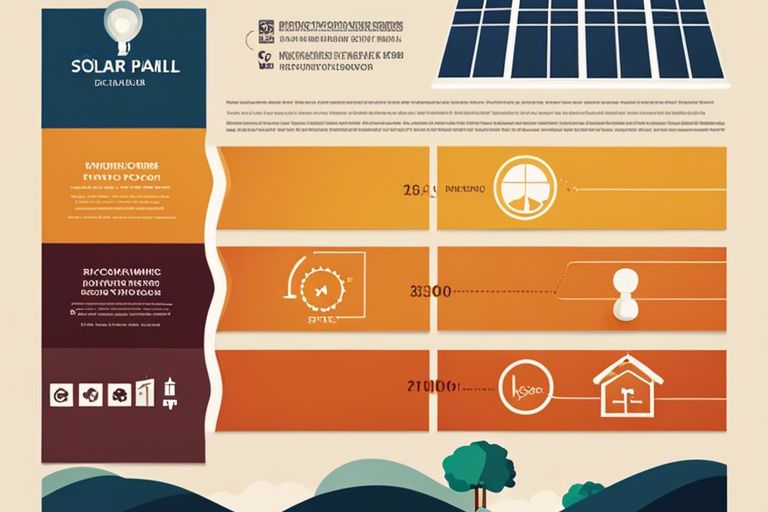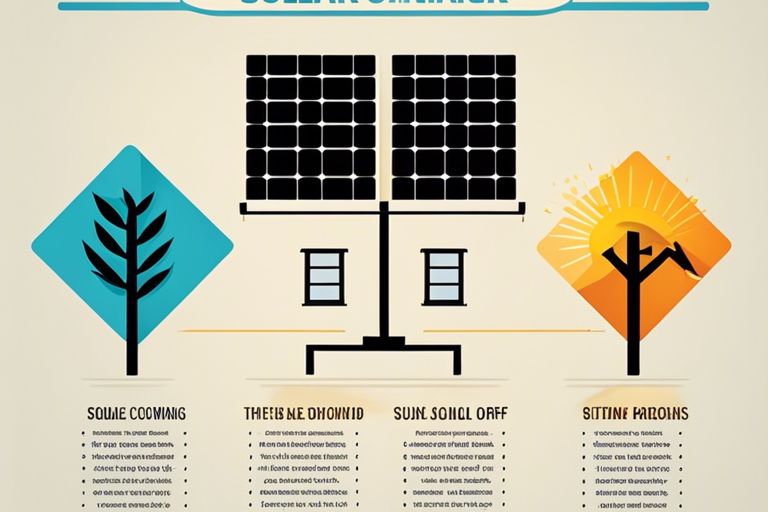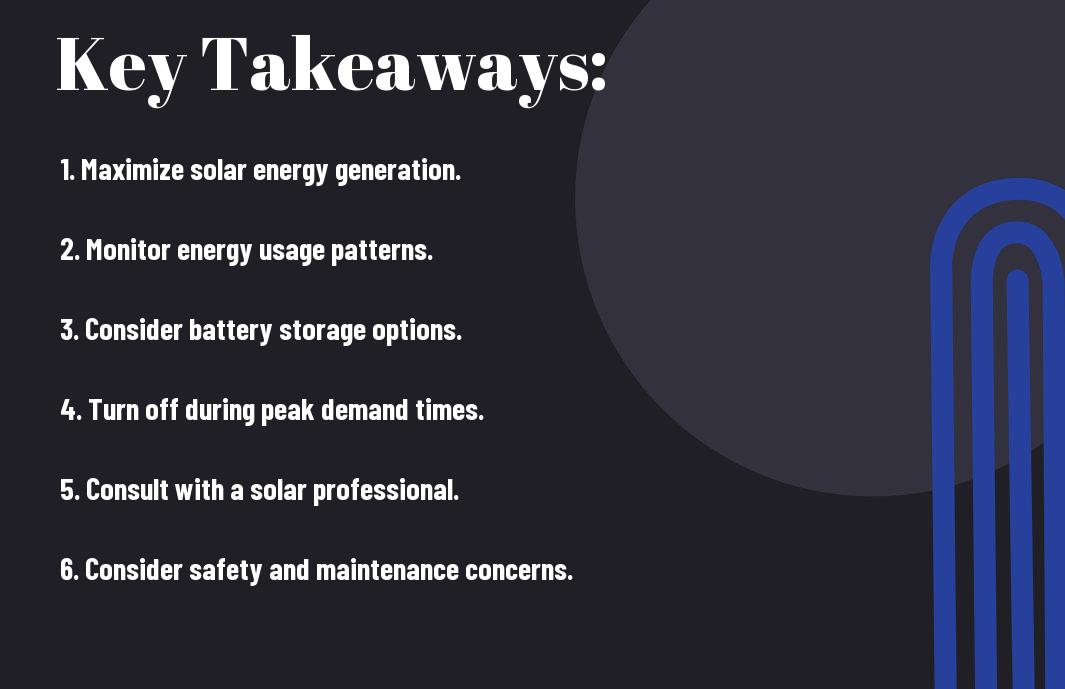There’s a common question floating around for those with solar panels – should you leave them on all the time? In this informative guide inspired by the environmental advocate David Suzuki, we will explore the benefits and considerations of keeping your solar panels on constantly. By the end of this post, you’ll have a clearer understanding of whether or not it’s beneficial for you to leave your solar panels on all the time.
Key Takeaways:
- Maintain efficiency: Leaving solar panels on can help maintain energy production efficiency by consistently harnessing sunlight.
- Energy storage considerations: Depending on your setup, leaving solar panels on all the time may not result in excess energy being stored, so be mindful of energy storage capacity.
- Weather conditions: Be aware of weather conditions and adjust the usage of solar panels accordingly to maximize their performance and longevity.
Benefits of Leaving Solar Panels On
Maximizing Energy Harvesting
Before we probe into the benefits of leaving your solar panels on, it’s important to understand how this decision can impact your energy production. With solar panels left on all the time, you can maximize energy harvesting throughout the day. This means that your panels can capture sunlight and convert it into energy whenever it’s available, ultimately leading to higher energy production for your home.
Reduced Energy Loss
With your solar panels on all the time, you can also experience reduced energy loss. Any energy that is not immediately used in your home can be stored in batteries or fed back into the grid for credits. This ensures that you make the most out of the energy your panels produce, minimizing waste and potentially lowering your overall electricity costs.
Additionally, leaving your solar panels on allows you to take advantage of sunny moments throughout the day, even when you’re not at home. This means that your panels can continue to produce energy and contribute to your household needs, further optimizing your energy usage.
Drawbacks of Leaving Solar Panels On
While Can i leave the solar inverter on all the time? may seem like a valid question, there are some drawbacks to leaving your solar panels on all the time that you should consider. These drawbacks include increased wear and tear as well as the potential for overheating.
Increased Wear and Tear
The constant operation of your solar panels can lead to increased wear and tear on the system. Just like any other electronic device, the more it is used, the more it is prone to breakdowns and malfunctions. Leaving your solar panels on all the time can shorten the lifespan of your system and may result in costly repairs or replacements down the line.
Potential Overheating
One of the potential risks of leaving your solar panels on all the time is the risk of overheating. Solar panels operate most efficiently when they are cool, and constant exposure to sunlight without breaks can cause them to overheat. Overheating can not only reduce the efficiency of your solar panels but can also pose a safety hazard.
Overheating can lead to damage to your solar panels and the inverter, reducing their lifespan and efficiency. It’s important to monitor the temperature of your solar panels and make sure they have adequate ventilation to prevent overheating.
Factors to Consider Before Making a Decision
Many factors come into play when deciding whether to leave your solar panels on all the time. Here are a few things to consider before making your decision:
- Climate and Weather Patterns
- System Design and Capacity
- Energy Usage Patterns
- Electricity Rates and Incentives
- Monitoring and Maintenance
Climate and Weather Patterns
Climate and weather patterns in your area can affect the productivity of your solar panels. If you live in a region with frequent cloudy days or long periods of little sunlight, leaving your panels on all the time may not be the most efficient option. On the other hand, if you experience consistent sunny weather, keeping your panels on could maximize your energy production.
Though weather patterns can fluctuate, it’s important to monitor and track your system’s performance over time to make an informed decision.
System Design and Capacity
Any solar panel system is designed based on your energy needs and the available roof space. The capacity of your system also plays a significant role in determining whether leaving your solar panels on all the time is the right choice for you.
For instance, if your system is oversized for your energy consumption, leaving it on all the time could provide surplus energy that you can store or sell back to the grid. However, if your system is undersized, you may need to be strategic about when to use it to meet your energy needs efficiently.
Maintenance and Inspection Requirements
Despite the fact that solar panels are low maintenance compared to many other energy systems, they still require regular care to ensure optimal performance and longevity. By keeping up with maintenance and inspection requirements, you can maximize the efficiency of your solar panels and avoid costly repairs down the line.
Regular Cleaning and Inspection
On a regular basis, you should clean your solar panels to remove any dirt, dust, or debris that may accumulate on the surface. This will help sunlight reach the photovoltaic cells more effectively, increasing the energy output of your system. In addition to cleaning, it’s important to inspect your panels for any signs of damage or wear. Check for cracks, corrosion, or loose connections, as addressing these issues promptly can prevent larger problems in the future.
Monitoring System Performance
Performance monitoring is crucial for ensuring that your solar panels are operating at their best. By keeping track of your system’s output on a regular basis, you can quickly identify any issues that may arise. Monitoring can also help you pinpoint any areas where energy production may be limited, allowing you to make adjustments or repairs as needed. Additionally, many solar panel systems come equipped with monitoring software that allows you to track performance in real-time and receive alerts if any issues occur.
Monitoring your system’s performance can give you valuable insight into how efficiently your solar panels are converting sunlight into electricity. By analyzing this data, you can make informed decisions about maintenance, adjustments, or upgrades to improve the overall performance of your solar energy system.
Energy Storage and Grid Connection
Now, when deciding whether to leave your solar panels on all the time, you may want to consider the options for energy storage and grid connection. To learn more about leaving your solar panels attached whilst away, you can check out this resource on Bluetti Power’s community forum.
Battery Backup Systems
Battery backup systems can be a valuable addition to your solar panel setup. These systems store excess energy generated by your panels during the day for use at night or during cloudy weather. By investing in a battery backup system, you can ensure a more consistent and reliable power supply, even when the sun isn’t shining.
Grid-Tied Systems and Net Metering
Grid-tied systems are another option to consider when it comes to using solar energy. These systems are connected to the utility grid, allowing you to feed excess energy back into the grid and receive credits for it. Net metering is a billing arrangement that allows you to offset your energy costs by exporting surplus energy to the grid. This can be a cost-effective way to make the most of your solar panels and reduce your electricity bills.
This setup not only maximizes the benefits of your solar panels but also helps support the overall efficiency and stability of the grid by balancing supply and demand. By staying connected to the grid, you can enjoy the flexibility of using solar power while still having access to electricity when you need it.
Safety Precautions and Considerations
Electrical Safety and Shock Risks
Considerations: In the matter of leaving your solar panels on all the time, it’s crucial to be aware of electrical safety risks. Solar panels generate electricity from sunlight, and if not installed or maintained properly, they can pose a risk of electric shock. To mitigate this risk, always hire a professional to install and inspect your solar panel system regularly to ensure it meets safety standards.
Fire Hazards and Prevention
Risks: Leaving your solar panels on all the time can also lead to fire hazards if not properly maintained. Issues such as faulty wiring, debris accumulation, or system malfunctions can increase the risk of a fire starting. It’s necessary to have a fire prevention plan in place, which includes regular maintenance checks, keeping the area around the solar panels clear, and installing a fire detection system.
Precautions: To prevent fire hazards, make sure your solar panels are installed by a certified professional and inspected regularly. Keep the area around the panels clear of any debris that could potentially ignite. Additionally, consider investing in a fire detection system that can quickly alert you to any issues and help prevent fires from spreading.
Conclusion
Ultimately, leaving your solar panels on all the time can be a beneficial practice, especially if you want to maximize your energy production and savings. By allowing your solar panels to generate electricity during daylight hours and feeding any excess energy back into the grid for credits, you can make the most out of your solar investment. Additionally, keeping your panels on can help you gain independence from fossil fuels and reduce your carbon footprint, contributing to a more sustainable future for our planet.
However, it is vital to monitor your energy usage and production regularly to ensure that leaving your solar panels on all the time aligns with your energy needs and goals. By being mindful of your consumption patterns and adjusting your usage accordingly, you can make the most out of your solar system and enjoy the benefits of renewable energy for years to come.
Q: Should I leave my solar panels on all the time?
A: It is generally recommended to leave your solar panels on all the time, as they will generate electricity whenever there is sunlight available. This allows you to maximize the amount of energy you can harvest from the sun.
Q: Will leaving my solar panels on all the time damage them?
A: No, leaving your solar panels on all the time will not damage them. Solar panels are designed to withstand continuous exposure to sunlight and are built to last for many years.
Q: Do solar panels generate electricity at night?
A: Solar panels do not generate electricity at night as they rely on sunlight to produce energy. However, you can still benefit from solar energy during the day by storing excess energy in a battery for use at night.
Q: Will leaving my solar panels on all the time increase my energy bills?
A: No, leaving your solar panels on all the time will not increase your energy bills. In fact, using solar panels can help reduce your energy bills by generating your own clean and renewable energy.
Q: Are there any benefits to turning off my solar panels?
A: There are no significant benefits to turning off your solar panels, as they are designed to operate continuously and efficiently. However, if you need to perform maintenance or repairs, it is advisable to disconnect your solar panels from the grid for safety reasons.



